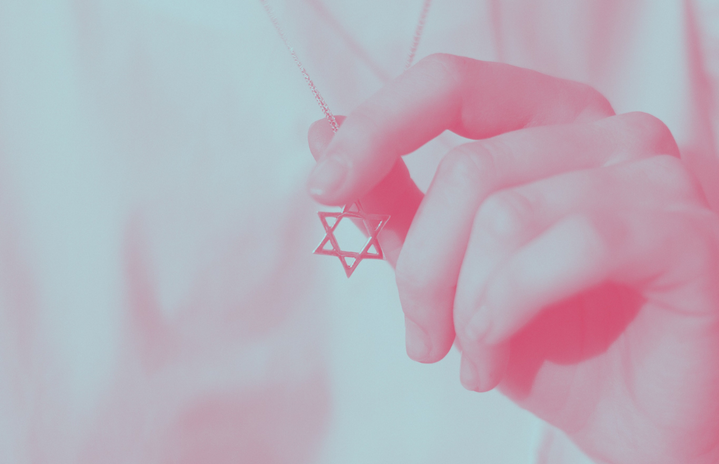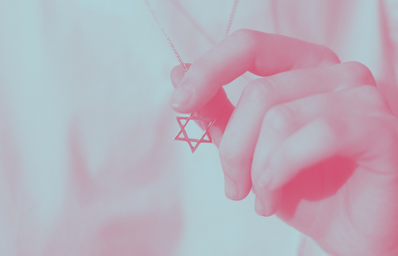On January 15, an armed suspect entered a Texas synagogue and held a rabbi and three others hostage for 10 hours. CNN reports that the gunman entered Temple Beth Israel in Colleyville, Texas, claimed to be looking for “night shelter,” then held Rabbi Charlie Cytron-Walker at gunpoint. The gunman reportedly made a series of ranting demands and asked for the release of his imprisoned sister — his reasoning being the antisemitic notions that “Jews control the media” and “Jews control the world.” What’s more: The gunman entered the synagogue on a Saturday, the Sabbath day in the Jewish religion. While the victims were able to exit safely and fortunately, no one was harmed, the hostage situation is a grim reminder of how difficult it is for Jews to simply exist in the world.
As a Jewish person, I found it painful to process the attack and subsequent hostage situation, especially given that the news cycle and social media failed to recognize the incident as antisemitic. Antisemitism is still a major problem in the U.S., with Jews consistently being the most targeted religious community in the country, according to the Anti-Defamation League. Despite the hostage situation being a clear, targeted act of antisemitism, an FBI special agent even told the public that the incident was “not related” to the Jewish community, and incorrect statements by the media have downplayed the gravity of the situation.
Following the hostage event, I’m sure it will be difficult for many Jewish Americans to step into a synagogue in the future without feeling afraid. That said, Jewish people shouldn’t be the only ones to care about acts of antisemitism that occur in America. It’s time for the non-Jewish community to stop being complacent and ensure that the Jewish community is recognized and respected. Even if you are not part of the Jewish community, antisemitism is your problem, too.
The hostage situation on January 15 was a clear act of antisemitism.
When the hostage situation took place on January 15, media outlets were reluctant to call it an act of antisemitism, and vague statements made by FBI representatives didn’t help the matter. Failing to call the hostage situation an act of antisemitism has dangerous consequences; it further pushes the false narrative that antisemitism doesn’t exist in the United States or in the modern world. And when news outlets fail to acknowledge antisemitism — or are slow to react as they were in January — it only makes Jewish people in America feel increasingly unsafe and like our concerns don’t matter.
According to 2021 research on anti-religion hate crime conducted by Statista, anti-Jewish crimes are the most common religiously motivated hate crimes in the U.S., with over 2,000 antisemitic acts committed in America in 2020 alone. However, it often appears that Jews have to do double the work to be perceived as a vulnerable group. Take Whoopi Goldberg’s recent comments about the Holocaust “not being about race,” for instance. Not only is she blatantly wrong because Nazis viewed Jews as ‘sub-human’, but these harmful comments only make Jews seem like we’ve been exaggerating or stretching the truth when we discuss and speak out against antisemitism. (Although Goldberg has since apologized, she is now on probation from ABC). The need for education around antisemitism continues, and Goldberg’s comments are yet another stark reminder that many Americans — including those who are high-profile, and seemingly informed — fail to acknowledge antisemitism or downplay its significance.
Despite the intensity of the hostage situation, social media carried on (mostly) as normal.
While the world seems to be moving on from this incident, Jewish people are not. January 15 was a tense day for the Jewish community as we struggled to make sense of the alarming hostage situation. Jewish people and leaders around the world spent the day glued to the TV or praying for the safe release of the hostages. Even so, it was incredibly jarring to log onto Twitter or TikTok and see that the internet was pretty much running as usual — people were still making memes and posting selfies like this were any regular day, with no recognition of the major act of antisemitism that was unfolding in the U.S. In fact, the incident barely made global news outside of international Jewish communities — once again demonstrating that antisemitism is often downplayed.
It’s concerning that such an extreme antisemitic act wasn’t enough to grab the collective internet’s attention. Events like the March for Our Lives Movement and the Black Lives Matter protests in 2020 powerfully demonstrated that social media can be a useful place to discuss, process, and spark activism in response to current events. However, my social media feeds appeared quiet on and after the January 15 events. When the internet is slow to respond to events of this magnitude, it sends the message that antisemitism isn’t something that deserves our collective outrage.
The lack of media coverage on the hostage situation has made processing the antisemitic act difficult for many Jewish people, including myself. On January 15, I didn’t feel like I could find an online space to safely navigate my feelings. If the media wasn’t covering the hostage crisis, then was I justified in feeling so scared? I didn’t feel like social media spaces offered me or fellow Jewish people a space to have our feelings heard and validated. Navigating traumatic events is already difficult enough as it is, and far more amplified when you’re dealing with it alone.
As a Jewish member of Gen Z, I implore you to take a stand.
Given Gen Z’s penchant for social justice and activism, I’ve been disappointed by my generation’s overall lack of action about the hostage situation and antisemitism in general. Antisemitic patterns appear to be reemerging in younger people; the Jewish on Campus movement chronicles instances of antisemitism on today’s college campuses, and the 2020 U.S. Millennial Holocaust Knowledge and Awareness Survey discovered a horrifying lack of Holocaust knowledge among millennials and Gen Z. Would it surprise you if I told you that nearly one-third of Jewish college students report having experienced campus antisemitism?
As a descendant of Holocaust survivors, I can’t help but think of how much my ancestors went through only for antisemitism not to be a concern for such a seemingly political generation. It’s disheartening to see my Jewish peers being forced to advocate for change only to feel like they’ve barely made a ripple. And as a member of Gen Z who is both politically active and has participated in activism myself, it’s a scary and saddening feeling to know I may not be advocated for in a time of need. If you consider your activism to be truly intersectional, then you must commit to advocating for Jews — for both our respect and our safety.
For many Jews, the hostage situation on January 15 was scary, but not surprising. Antisemitism was on the rise in 2021 — at record numbers, in fact — and as we saw just last month, it hasn’t stopped yet. The ugly truth is antisemitism still exists, and from Robert F. Kennedy, Jr. comparing dodging vaccine mandates to Anne Frank’s hiding to a Tennesee school board recently banning the Holocaust graphic novel Maus, the conversation around antisemitism in America is looking increasingly grim. It has definitely been a rough start to 2022 for the Jewish American community, and it’ll likely take a while to process the frightening hostage situation in the weeks to come.
As for the non-Jewish community, I hope this serves as a wake-up call. Check in on your Jewish friends and have conversations about antisemitism, even if it feels uncomfortable. Do your research; even try and buy Maus if you can. If you consider yourself an activist, please take these events as a call to action to listen to Jewish voices when we tell you we feel unsafe — and like we’re too tired or scared to do all of the work against antisemitism ourselves. When it comes to injustice, there is never an excuse for inaction.


